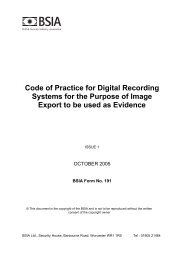<strong><strong>IP</strong>focus</strong>On-the-RecordOn-the-Record;Ian Tredinnick, ManagingDirector, Chiron TechnologyThe latest in the series of interviews with those influencingthe future of security and surveillance technology. <strong><strong>IP</strong>focus</strong>quizzes those in the know and gains an insight into opinionsthat will be shaping the industry in the future.Q. Why is <strong>IP</strong> becoming important to the alarm receiving and monitoring sector?A. Right now <strong>IP</strong> is proving to be a liberating technology for the alarms sector, right acrossEurope and in many countries worldwide. What we are seeing, in country after country,is that former state-monopoly providers are losing their hold. From Scandinavia toAustralia <strong>IP</strong> is freeing-up the market from domination by formerly-powerful PSTNoperators and is allowing innovation, competition and all the benefits that brings.More importantly the old PSTN and ISDN networks are being removed and replaced withVO<strong>IP</strong> which can give problems and higher rates of failure for alarms. When we arelooking at Fire, and Social Care where lives are at risk, such lowering of reliability isunacceptable and the only real option is to use <strong>IP</strong>.So far the UK has been an unusual case. Here, the domination by BT Redcare wasparticularly entrenched, and before <strong>IP</strong> came along it was the best solution forcustomers. But fixed lines are no longer the best answer and, ultimately, the UK industrywill follow business logic. Customers are becoming aware of the benefits of moreflexible alternatives for alarm transmission, not least significantly lower costs and asignificantly smarter service.Q. Will BT and 21CN alter the attitude to <strong>IP</strong> networks?A. Almost certainly, as there will be no option other than to use <strong>IP</strong> whether it is as VO<strong>IP</strong> ordata, and systems such as Iris Touch will become mandatory for security monitoringand alerting. Whilst the UK is well behind Europe with introducing <strong>IP</strong> and BT’s delays inintroducing modern technology such as 21CN, we will see an uptake in <strong>IP</strong> as Fibre isrolled out and corporate networks take up the <strong>IP</strong> opportunities for corporatecommercial services and CCTVQ. How do you see the <strong>IP</strong> transmission systems and monitoring sector developing in theshort and long term?A. This is a hugely exciting time for us as a company, and for the wider market. Ok, thingsare moving at different speeds in different countries, but the direction is all forwardsand in every market things are accelerating. Our newly launched IRIS Secure Appssolution is the culmination of two years of development (more if you take into accountall the work that went into all the products that led us to this point) and we think theeffects are going to be dramatic. We are giving ARCs the ability to do things thatthey’ve never been able to do before, such as having a complete overview and fullcontrol over all their monitored alarms – allowing them to see how their systems areperforming, both in real time and historically. The ARCs will pass these benefits toinstallers (allowing them to work much more independently) and ultimately the massmarketend-user will win too.Q. Where is Chiron placed in the market?A. In sales volumes, we are Europe’s market leading supplier of <strong>IP</strong>-based alarmtransmission technology. More than 38,000 of our IRIS and IRIS Touch products are nowinstalled, and more than 180 ARCs monitor them for customers across 28 countries. Ourturnover has increased by 100% for the past two years, and it’s going to be double thatthis year – not just because of our sales techniques but because the market reallywants what we’ve developed.We aim to be the technology leader in this market. We were the first to achieveindependent certification by the highly regarded VdS testing house, and no othercompany has matched us in that.Q. What new plans does Chiron have to help alarm customers and alarm receivingcentres make the jump?A. We’ve just made the big jump, with the introduction of IRIS Secure Apps. We arealso developing new services such as Social Care and Visual Verification, whichwill come in just below the current CCTV cost threshold and link Alarm monitoringwith Visual notification in a more integrated way.The next step will be that we’ll push hard to promote it in the market, and at thesame time we will continue developing it technically. One great feature of thesystem is that upgrades will be automatically uploaded, so as customers come onboard they’ll stay with us at the leading edge.Q. Will the IT sector ever take over the alarm security sector?A. The alarm security sector is evolving – we’ve seen how the more nimblecompanies have taken advantage of <strong>IP</strong> technology in the CCTV field, and the sameis happening in the alarms sector. But I don’t think there will be a wholesale takeover,because there doesn’t need to be. The biggest gulf is in that the IT industrydoes not understand fully yet the regulated state and requirements of theSecurity industry. In many parts of the IT industry there is a relatively simplisticbelief that the security that is used in IT systems is adequate for securitysystems. Whilst we may use the same technology there is a gulf in understanding.While it’s true that more skilled and IT-literate people are coming into the market,both working for and running security companies, long-standing securityinstallers shouldn’t be worried about adapting. We’ve reached a point where thetechnology is really designed to be easy to use, and at the same time mostpeople now have a good grasp of key IT skills – so anyone who wants to make thejump into <strong>IP</strong>-alarms will be able to, if they are reasonably competent.Q. How can traditional security and alarm providers win contracts against the ITintegrators. What is the best piece of advice you could give?A. Do what you are good at – give solid advice based on knowledge of risk, crimeprevention and security techniques, as well as regulatory and Insurancerequirements – but make sure you upskill in the IT arena as well. Collaboration ismore useful than competition and if good security companies pick the rightpartners (solutions providers, consultants and specialist integrators) there’s noreason for them to be left behind.Q. Do installers respond well to new technology or are they slow?A. Installers are great with new technology, as long as it makes good business sensefor them. When the sums add up, they take to new systems willingly. What theydon’t want is things that make their lives more difficult, or change for change’ssake. If it’s good innovation that will help them be profitable, they will run with it -as we have seen everywhere in Europe. Things have been slower in the UK, but it’snot the installers who are unimaginative but really the market conditions here.38_issue 27
<strong><strong>IP</strong>focus</strong>Q. Are there any monitoring companies which will never use <strong>IP</strong>?A. If there are, they’ll be really swimming against the tide – and missing out.Q. Is the relationship between the security Sector and the new technology companiesimproving or not?A. I do not see much progress in this area, as the gulf in understanding is too wide. TheIT industry thinks our Security Industry is easy and does not understand theregulatory nature and influence of the Insured sector, let alone understanding howARC’s work. On the other hand, The Security Sector are building walls and not tryingto adopt new technologies. There are exceptions on both sides where more awarecompanies are growing, and it is these that will profit most in the long term.Q. How does Chiron regard their dealings with traditional customers as opposed to ITintegrators?A. We started from the point of what was needed, technically, to make alarm signallingbetter. Based on that foundation, we have developed our IRIS solutions so thateveryone can work with them. We don’t think it’s helpful to categorise customers aseither traditional or IT-literate, the important thing is that IRIS is easy to work withand that every customer gets help if they need it. We’ve put a lot of effort into ‘deskilling’our systems, removing the need for specialist IT knowledge, not becausepeople aren’t capable or interested, but because we know they are busy and want tosave time. The same time pressures and business pressures are on everyone, nomatter what their level of IT-literacy.In practice, we find there is a natural reticence in many parts of the IT industry tosecurity, as previous experience of many IT professionals of high CCTV trafficloadings have caused concern, but for the Monitoring Sector when we explain theloading factors and the fact that alarm traffic is similar to a credit card terminal,then this reticence is quickly overcome.Q. Will large IT managed service providers win out over traditional receiving andmonitoring centres?A. This is an important question and one of the key reasons why we’ve developed IRISSecure Apps; to help ARCs compete better and deliver increased services to theircustomers. It shows the way the market will move, with ARCs having greater control,working more flexibly with installers, and benefiting from much greater priceflexbility. We work closely with more than 180 ARCs and are confident that the sectorwill continue to prosper, so long as it adapts. It should be remembered that ARCs arereal specialists doing a specific and skilled job.Q. Does Chiron support the idea of independent consultants representing end users?A. Yes, providing they are knowledgeable and properly independent. In the securitysector there is a very well established network of consultants, and the way they workhelps to spread new ideas and good practice among end-users. As Chiron is keen to‘educate’ the customers with new ways of thinking, we benefit from this spread ofideas and the sharing of expertise.Q. Where does the UK sit with regard to Europe with <strong>IP</strong> for the security sector asagainst the more general IT users of <strong>IP</strong>?A. The UK is lagging well behind as a market for very particular reasons. This said, thebenefits of <strong>IP</strong>-alarm transmission are self-evident and the market here will catch up.Q. How does the UK alarm and monitoring sector compare to those in other countries,especially with respect to the adoption of <strong>IP</strong>?A. In the UK we have had a monitored sector with Redcare and there is some reticenceto change as this is well known. However it is expensive and offers few services whencompared to the new <strong>IP</strong> systems. In Europe there has been less monitoring of alarmsoutside high security, therefore many ARC’s are hungry to offer new businessopportunities that <strong>IP</strong> can bring and also extend monitoring further into the market.These new opportunities as well as technology change of the Infrastructure going toVO<strong>IP</strong> is generating significant demand in Europe for our products.Q. What other countries are big potential areas for <strong>IP</strong>?A. It’s global – the only question is which countries will develop the fastest. For Chironthe big growth areas have been Scandinavia, Germany, Benelux, Switzerland, Spainand in fact most of the EU. More recently we’ve also had major success in Australiaand Asia.Q. For the security sector, how will <strong>IP</strong> develop? Will this be via hybrid or add-on systemsand users start today?A. Currently there are few Security products which have integrated <strong>IP</strong>, and these tend tobe manufacturer proprietary systems which do not enamour Monitoring Centres whowould have to run many incompatible alarms <strong>IP</strong> systems. The main growth in theshort term will be for add-on or hybrid systems. However, in the longer term systemsintegration will come and Chiron will be announcing a number of alliances this yearwith manufacturers who recognise the Power of our Iris systems and will embed ourprotocols. The fact is that with over 180 of the major worldwide MonitoringCompanies offering our Iris system, this is a major opportunity to manufacturers.Q. How long will it be before <strong>IP</strong> penetrates the intruder alarm sector in the same way ithas with CCTV?A. It’s a bit like trying to predict an earthquake – when it happens, it happens quickly.We’ve seen our turnover suddenly take-off in country after country and we expectthe UK to follow this same model when it is ready. Second-guessing the timing isdifficult, and not particularly helpful. From early on we’ve focused our energies ondeveloping the technology and working with the most receptive markets. This gaveus the resources to develop more quickly than some of our competitors, who werehampered by their reliance on the UK market.Q. Do we see the IT industry accepting security and safety as the next killer applicationand taking over this sector?A. On balance, probably not in the alarms sector. For reasons outlined previously, <strong>IP</strong>alarms technology is now open and accessible to all installers and ARCs. Even if theIT sector suddenly gets excited about security, there’s no reason why securitycompanies will have to stand back and lose business. There’s a lot of expertise in thesecurity sector – not to mention contacts – and you can’t just write that off. We workwith security companies of all sizes in all countries, and they’re doing fine with <strong>IP</strong>.The key, as in all private sector business, is to be forward looking and adaptable.Q. Will hosted services such as virtualisation, SaaS (Software as a Service) and Cloudcomputing technologies impact on the monitoring centres and the alarm industry.A. We live in a practical world and one which is highly regulated. Cloud computing andvirtualisation are concepts which will need to be proven to work and proven to bereliable and gain acceptance before we can risk critical systems which the securityindustry controls. The jury is out on this one, but I would be very cautious aboutsome people’s vision on how computing will develop. I still remember Clive Sinclairand his C5 electric car we would all be running around in.Q. How do you see the role of the <strong>IP</strong> User Group and <strong><strong>IP</strong>focus</strong> influencing thedevelopment of <strong>IP</strong> in the new areas of alarm receiving and monitoring in the comingmonths and years?A. By helping to spread knowledge and encouraging people to network. In any fastchanging sector there’s a need for information sharing and that’s an important jobthat the <strong>IP</strong> User Group can do. Of course it’s also up to members to make use of theforums that you provide.BiographyIan Tredinnick is Managing Director of Chiron Technology, which heco-founded 19 years ago after 25 years spent in the IT & Telecomms industry.Chiron's Iris system is used by more alarm monitoring centres that any othersystem, being applicable to both high and low security systems. For moreinformation contact him on 0118 988 0228 or email ian@chiron.uk.comissue 27_39














